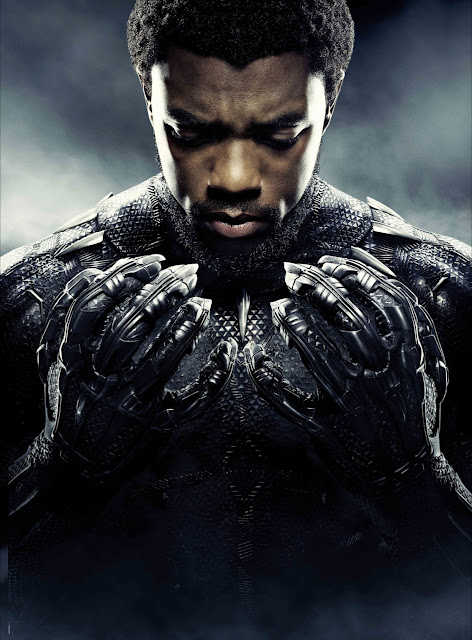Black Panther and The Power of Visual Representation
Black Panther and The Power of
Visual Representation
I actually wasn't
going to write anything about Black Panther after Chadwick Boseman's passing,
because I assumed everyone, at least the reasonable ones, got the memo!
However, I read an
update today which wasn't only distasteful in its timing, but myopic in its
submission. If all that was derived from watching Black Panther is the CGI
effects, then may be some people are just lacking in depth.
Beyond the hype,
because I am not easily swayed by the media or public opinion, the impact Black
Panther had is immeasurable. Black Panther wasn't just about CGI effects, but
the nuances of the portrayal. Analysing the movie, there are many lessons that
could be derived, but I will highlight just a few.
Pacesetting
In an industry where the archetypal cinematic portrayal of the 'White saviour'
has been the norm, Black Panther challenged pre-existing stereotypes. There
were genuine pre-production concerns about the commercial success of the movie.
With a predominantly Black cast, history was made and Blank Panther went on to
make over $1. 3 billion dollars in box office revenues.
Broadening Horizons
Black Panther achieved in a couple of hours, what decades of literature
couldn't, by bringing aspects of history and visionary abstract to life.
For decades, children of
African-descent have been taught that they were once great kings with powerful
nations, but their contemporary realities make it difficult to conceptualise
these historic tales. However, Black Panther made it easier to visualise what a
futuristic Africa nation could look like. Children are the future, so it was
comforting to see a lot of children going to cinemas to watch Black Panther and
coming out with their heads raised high. They finally got it!
Global Impact
The positive impact wasn't just limited to Black families. For instance, I have
an Asian friend whose son is a huge Black Panther fan and has a lot of Black
Panther merchandise. His son felt sad that 'Black Panther' had died. His dad
had the onerous task of explaining that it was Chadwick Boseman that died and
not Black Panther.
Also, I saw pictures of children
across the globe mourning Chadwick Boseman in their own way. So the admiration
cuts across skin tones. Children of various backgrounds were proud to associate
with a Black Superhero.
Challenging
Westernised Standards of Beauty
Black Panther showcased beautiful 'Nubian' women who were proud of not just
their luminous skin, but their natural hairstyles - afros, Bantu knots, braids,
dreads, low cuts etc.
The fight scene at the Korean club
where Okoye flung her wig away was symbolic! She was already complaining about
the wig and when the action started, she wanted to be liberated. Black Panther
encouraged a lot of females - young insecure girls especially - to embrace
their natural God-given beauty.
Legacy of
Colonialism
In the Killmonger Museum scene, when Erik Killmonger was supposedly making
enquires at the museum, the curator stated the artifacts on display weren't for
sale. Killmonger responded by stating: "How do you think your ancestors
got these? You think they paid a fair price? Or did they take it like they took
everything else?"
This scene depicts the legacy of
colonialism and how colonies were ravaged by marauding imperialists. The British
Museum still contain artifacts looted from Africa during the colonial era.
Sadly, some people in the Western world still glorify colonialism and justify
keeping these looted artifacts.
Motivation for
African Nations
The movie gave a glimpse into what a African superpower nation could look like,
especially one that was never colonised. During T'Challa's speech at United
Nations, the condescending question about what "a nation of farmers have
to offer the rest of the world", is, unfortunately, the contemporary
reality, and the general perception of Africa. Despite its huge resources, the
motherland generally still hasn't attained its full potentiality. This is a
challenge for Africa to tidy up its act. The whole world is watching!
Effects of the Slave
Trade
Post the second fight scene between T'Challa and N'Jadaka. T'Challa offered the
option of healing N'Jadaka, but he refused the offer and responded with a
profound statement: "Just bury me in the ocean with my ancestors that
jumped from the ships. Because they knew death was better than
bondage".
This scene hit me the first time I
watched the movie and it resonates with those who reflect on the legacy of the slavery
enterprise. During the Atlantic slave trade, tens of millions of Africans died
during transportation. Some of the captured Africans fought on board the ships
and jumped off, some were deliberately killed and dumped for reasons that
included illness and being surplus to requirements - basically to lighten the
load. God knows how many souls perished in the ocean. Some of those who
survived the journey and made it to slave plantations, wished they had died!
The descendants of those captured free human beings are literally still being
hunted, maimed and killed - generally treated unjustly by an unjust
system.
Putting all these points into context makes Chadwick's death more poignant, because he chose the noble path of confronting societal stereotypes, whilst confronting his own personal battle with cancer. And for that he has my respect. ✊🏾R.I.P Chadwick Boseman🙅🏾♂️
© M.B.O




Comments
Post a Comment